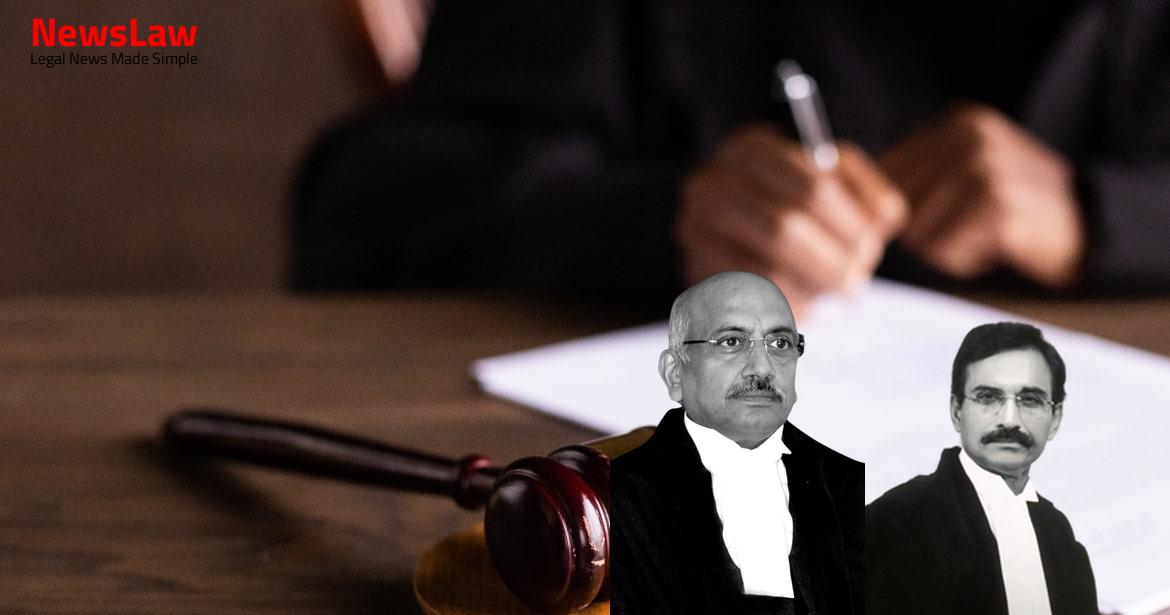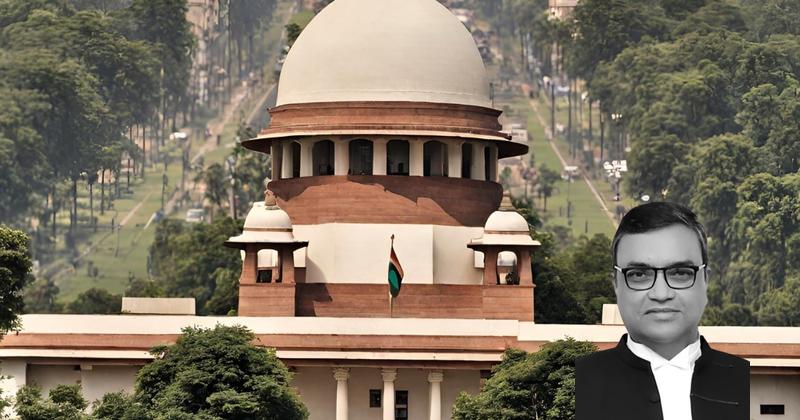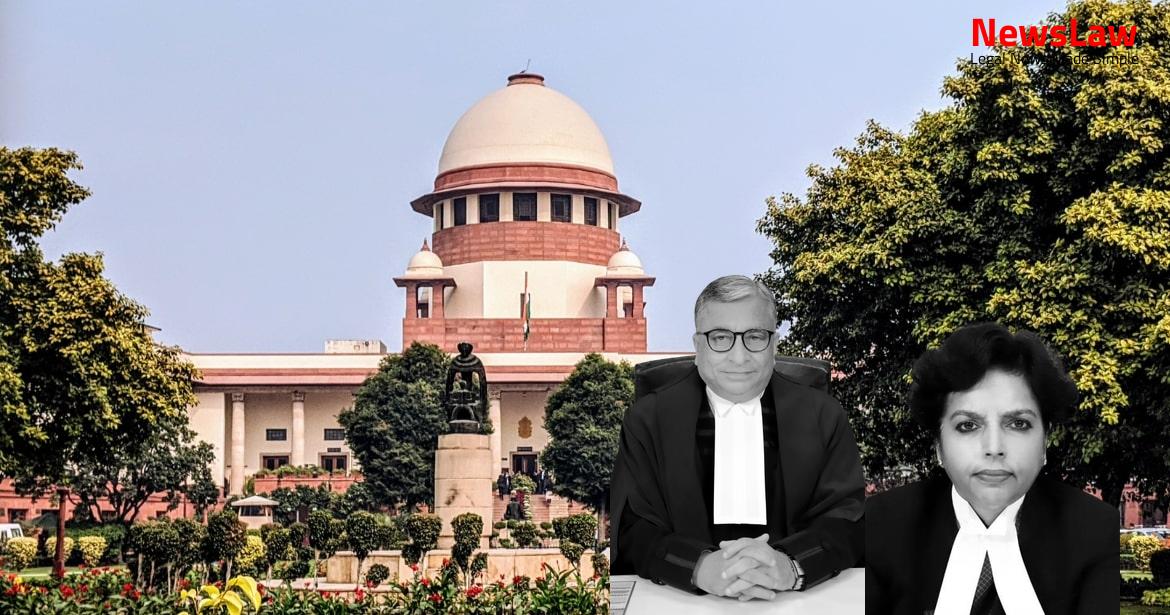In a recent ruling by the Supreme Court of India, a significant case involving the Armed Forces Tribunal and the High Court of Delhi was addressed. The judgment scrutinized the jurisdictional limits of the Tribunal in relation to service matters and appeals from Court Martial verdicts. The Court dismissed the Appeal, upholding the Tribunal’s decision. Stay informed about this crucial legal development! #ArmedForcesTribunal #SupremeCourtOfIndia #LegalJudgment
Facts
- The Tribunal found that no prima facie case was made out against the Respondent based on the evidence presented.
- The charges framed against the Respondent were deemed unsustainable and quashed.
- Extra expenditure for transportation by the supplier was highlighted in the evidence.
- The Tribunal reviewed the evidence of Mr. P.V.D. Prasada Rao and concluded that even if the prosecution’s evidence is true, no offense was made out against the Respondent.
- The Tribunal determined that a prima facie case for a General Court Martial against the Respondent was not established.
- Regarding the second charge, no substantiating evidence was found to show that the supplier was benefited due to any act or omission by the Respondent.
- No monetary benefit or extra expenditure was shown to have been derived by the Respondent from the addition of two tendering stations, and no violation of government instructions was observed.
- The lapses on the part of the Respondent were deemed to have no foundation for prima facie showing.
- Charges related to deviation from ASC specifications and price reduction in risk purchase contract were discussed.
- The Union of India appealed against the Armed Forces Tribunal’s decision to quash the General Court Martial convened against the Respondent.
- A Court of Inquiry was conducted to identify Army personnel responsible for irregularities in ration procurement, with the Respondent being one of the twelve individuals identified.
- Disciplinary action initiated against the Respondent was challenged in court, leading to the Court of Inquiry being quashed due to a violation of Army Rules.
- The Tribunal accepted the contention that the Director General of Supplies and Transport had the sole authority to grant relaxation of specifications, indicating the Respondent did not have the power to over-rule this decision.
- The Tribunal’s assessment led to the charges against the Respondent being quashed.
- The Appellants sought a modification of the order dated 29.07.2008 and informed the High Court about difficulties in re-constituting a Court of Inquiry due to retired officers.
- The High Court permitted the Appellants to proceed under Rule 22 with a condition not to rely on the old Court of Inquiry.
- The retired officer, General Officer Commanding (GOC), 15 Infantry Division found no prima facie offence against the Respondent upon retirement.
- The GOC-in-C, Western Command disagreed with the GOC, 15 Infantry Division, and GOC, 15 Corps, concluding a prima facie case against the Respondent.
- The Tribunal examined charges related to tendering stations in Madhya Pradesh, holding that those additions were not within the jurisdiction of the Respondent.
- Efforts to obtain leave to appeal under Section 31 of the Armed Forces Tribunal Act were not entertained by the Tribunal.
- The Chief of the Army Staff’s order taking cognizance of offences and the attachment order were the subject of a dismissed Writ Petition in the High Court of Delhi.
- A hearing under Rule 22 and recording of evidence under Rule 23 of the Army Rules were ordered against the Respondent.
- The Respondent sought promotion to the rank of Major General along with batchmates, but Section 123 of the Army Act was invoked to continue the proceedings.
Also Read: Case of Technical Equipment Officer Appointment Criteria Dispute
Arguments
- Ms. Diksha Rai, learned counsel for the Appellant, argued that the judgment of the Tribunal had a jurisdictional error.
- She referenced the statement of objects and reasons of the Act to emphasize that the Tribunal’s jurisdiction is limited to service matters and appeals from Court Martial verdicts.
- Ms. Rai contended that the Tribunal did not have the jurisdiction to consider the O.A. at the interlocutory stage.
- Mr. K. Ramesh, argued that Section 14 of the Act gives the Tribunal authority in service matters equivalent to that of Courts, except the Supreme Court or High Courts under Articles 226 and 227 of the Constitution.
- He emphasized Section 14(2) allowing anyone affected by a service matter order to apply to the Tribunal.
- Mr. Ramesh asserted that the Tribunal’s jurisdiction should not be limited unnecessarily and argued the validity of the order convening the General Court Martial was rightfully overturned by the Tribunal.
- Sections 14 and 15 of the Armed Forces Tribunal Act, 2007 were crucial for the case, granting the Tribunal extensive powers in service matters.
- He claimed that the Tribunal overstepped its bounds by delving into the case’s merits, a role reserved for the Court Martial.
Also Read: House Breaking by Night: Verdict Reversal and Reinstatement of Military Personnel
Analysis
- The Tribunal has the power to admit or dismiss applications relating to service matters after due inquiry.
- The Tribunal can grant bail to individuals accused of an offence and in military custody, with or without conditions, except for serious offences.
- The Tribunal can allow appeals against court martial convictions if the finding is legally unsustainable, involves a wrong decision on a point of law, or if there was a material irregularity resulting in a miscarriage of justice.
- The Tribunal has the authority to substitute findings of guilt for other offences, remit, mitigate, or commute sentences, enhance sentences, release on parole, suspend imprisonment sentences, and pass other appropriate orders.
- The Tribunal is deemed to be a criminal court for certain purposes under the Indian Penal Code and the Code of Criminal Procedure.
- The definition of ‘service matters’ includes various aspects related to the conditions of service for military personnel but excludes certain specific matters.
- The Tribunal has the same powers as a Civil Court under the Code of Civil Procedure while adjudicating applications.
- The Tribunal has jurisdiction over appeals against orders, decisions, findings, or sentences passed by a court martial, and individuals aggrieved by such orders may file appeals.
- Proceedings initiated against Original Name cannot be considered unrelated to his service.
- Proceedings leading to termination fall within ‘relating to conditions of service’ definition.
- Matters related to conditions of service can be subject to Tribunal application.
- Conditions of service encompass post-holding from appointment to retirement, including dismissal.
- Appeal under Section 15 not maintainable without Court Martial order or decision.
- Definition of ‘service matters’ includes termination of service.
- Exclusions mentioned in Section 3(o) do not apply to this case.
- Jurisdiction of Tribunal under Section 15 for appeal against Court Martial orders.
- Section 14 allows aggrieved parties to apply to the Tribunal in service matters.
- O.A. filed under both Sections 14 and 15 of the Act.
- In the case of Mansukhlal Dhanraj Jain v. Eknath Ogale, ‘relate’ was defined as standing in some relation, having bearing or concern, pertaining, referring, or bringing into association with or connection with.
- The definition of ‘relate’ from Blacks’ Law Dictionary was considered in this case.
- Section 14 of the Act conferring jurisdiction over service matters of Army personnel should be construed widely.
- The Tribunal correctly assessed the charges and found no error in their approach.
- The Tribunal examined the material on record and concluded that no prima facie case was established against the Respondent.
- Interpretations that uphold jurisdiction should be favored over those that limit it.
- The Act’s purpose is to adjudicate complaints and disputes on service matters, not just to entertain appeals against Court Martial verdicts.
- The statement of objects and reasons can be used for interpretation purposes.
- The Tribunal’s judgment was found to have jurisdiction and no lack thereof.
Also Read: Transfer of Employees to FCI: Supreme Court Judgement
Decision
- This specific part of the judgment refers to the RPC findings.
- The court does not find any reason to interfere with the said findings.
- As a result, the Appeal has been dismissed.
Case Title: UNION OF INDIA Vs. P.S.GILL
Case Number: Crl.A. No.-000404-000404 / 2013



